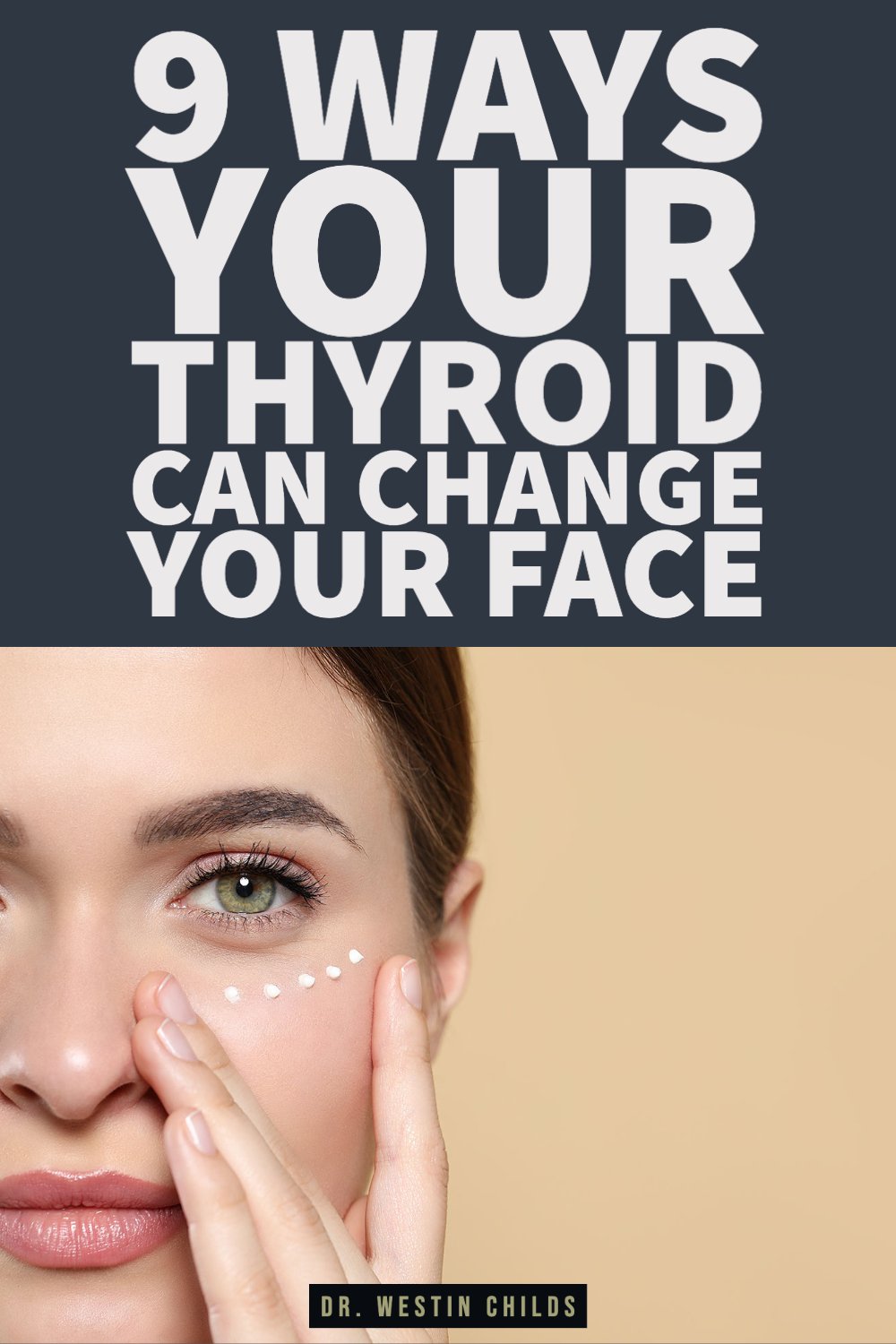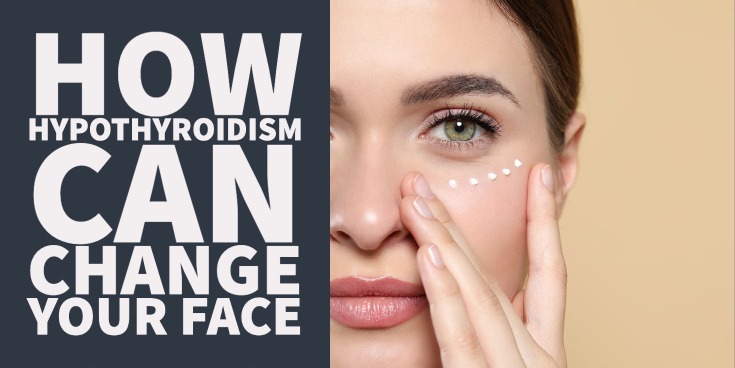Most thyroid patients are well aware that changes in thyroid function can lead to problems like weight gain and depression but did you know that hypothyroidism can also impact your physical appearance and change the shape and structure of your face?
It’s true!
Your thyroid impacts and regulates just about every tissue in your body so it should come as no surprise that tissues such as your skin, fat mass, lips, eyes, and eyebrows can all show changes when a thyroid problem is present.
This may seem discouraging, but it doesn’t have to be.
The good news is that fixing your thyroid can reverse most (if not all) of the changes we are about to talk about.
Your Thyroid Can Steal Your Beauty
I always say that hypothyroidism is a silent beauty killer.
This disease has a tendency to take what matters most from people whether that be their energy, their hair, their sex drive, or their body.
Thyroid dysfunction is no respecter of persons.
And one of the most sinister things about beauty symptoms related to your thyroid, especially facial changes, is that they go unnoticed and unappreciated by most patients!
It’s not that they don’t notice them but more that they fail to realize what’s causing them.
It’s easy to assume that small subtle changes to your face may just be related to things like sun damage or age (1), but what if they were caused by a potentially reversible condition like your thyroid?
Wouldn’t you want to know?
I would assume so.
I don’t think it’s a problem to say that many people care about the way that they look.
If that wasn’t the case, then why do people spend billions of dollars each year on weight loss (2), cosmetic products, and cosmetic surgeries?

From hair extensions to liposuction, people spend money on the things that they care most about.
If you want to spend money on something like hair extensions then be my guest, but I’m here to tell you that it may be a good idea to look at your thyroid first.
You may ultimately find that the problems you are experiencing are not due to getting older but are caused by low thyroid function that can be treated.
DOWNLOAD FREE RESOURCES
Foods to Avoid if you Have Thyroid Problems:
I’ve found that these 10 foods cause the most problems for thyroid patients. Learn which foods you should avoid if you have thyroid disease of any type.
The Complete List of Thyroid Lab tests:
The list includes optimal ranges, normal ranges, and the complete list of tests you need to diagnose and manage thyroid disease correctly!
How Hypothyroidism Changes Your Face & The Way That You Look:
Before we talk about how hypothyroidism can change your face, you should be aware of a few things:
- These symptoms are primarily related to low thyroid or hypothyroid states – We won’t be talking much about hyperthyroidism but you should be aware that hyperthyroidism can also cause problems with the way that you look.
- These symptoms can also be caused by other conditions and issues – Some of these symptoms are fairly generic while others are highly specific to a thyroid problem. If you are currently experiencing any of these issues make sure you look at more than just your thyroid.
- Before spending money on cosmetic procedures to fix the problem, adequately test your thyroid first – In order to accurately test your thyroid you will need these tests: TSH, free T3, free T4, thyroglobulin antibody, and thyroid peroxidase antibody. Don’t settle for just a TSH.
With these in mind, let’s jump in:
#1. Facial Swelling or Facial Puffiness
When you wake up does it look like your face is swollen or puffy?
It could be your thyroid contributing to what is referred to as facial edema or facial swelling.
This type of swelling should be differentiated from some of the other swelling we will discuss later because this version is widespread and impacts the entire face.
Most people who experience this issue say that their face looks fat or round, typically when they first wake up.
As they get up and walk throughout the day this swelling may subside as gravity drains the extra fluid from their face back into circulation through their lymphatic system.
Facial swelling in hypothyroidism can be caused directly by low thyroid function itself or it may be indirectly related to your thyroid through the immune system (3).
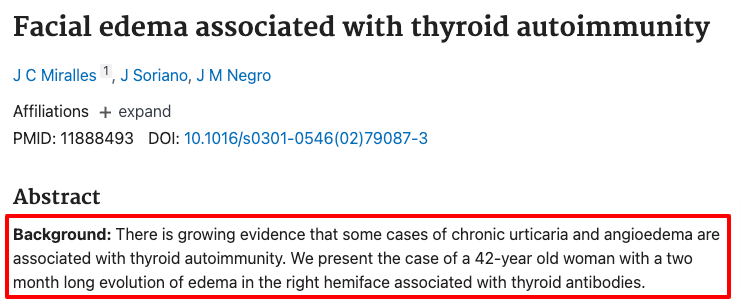
It can sometimes be tricky to figure out what is causing this particular issue because many factors can contribute including electrolytes, the immune system, and the responsiveness of specific tissues to thyroid hormone.
Fortunately, this particular issue is more common with advanced hypothyroidism and is not routinely found in mild to moderate cases.
But if you have a particularly severe case of hypothyroidism, you may experience this type of facial swelling.
If that is the case then you are also more likely to experience more advanced changes in skin tone and skin texture as well.
If you are experiencing facial swelling then try these treatments:
- Optimize your thyroid medication.
- Try lymphatic drainage techniques (4).
- Try facial massage, neck exercises, or facial yoga (5) in the morning or in the evening (it can work wonders)
- Make sure your electrolytes are all normal and optimal with some basic testing.

#2. Eyebrow Hair Loss
Unlike facial swelling, eyebrow hair loss is a very common symptom of hypothyroidism.
Unfortunately, it’s often one of the first and earliest signs of hypothyroidism and one of the last symptoms to resolve when you finally start treating your thyroid.
In other words, it can take many months to resolve.
Generalized hypothyroidism can cause two different types of eyebrow hair loss:
- Generalized eyebrow hair loss and thinning throughout the entire brow.
- And a specific pattern of hair loss on the later one-third of the eyebrow.
This small distinction is very important because it can help differentiate between the various causes of brow-related hair loss.
Generalized eyebrow hair loss can be caused by all sorts of issues but brow hair loss on the lateral one-third of your brow is almost always related to your thyroid.
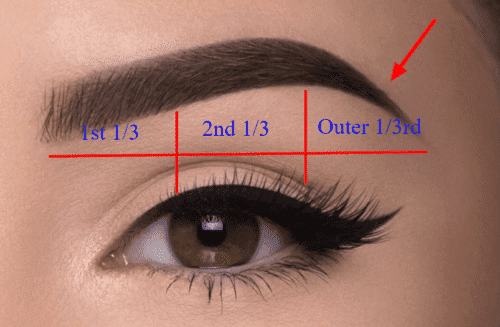
A word of caution to anyone experiencing this type of hair loss:
Don’t get overzealous with your tweezing.
Not only does hypothyroidism cause eyebrow hair loss but it also severely slows back the growth of new hairs.
If you’ve already noticed a significant decline in eyebrow hair, and it’s particularly discouraging to you, then you may want to look into temporary options like microblading while you optimize your thyroid.
Just be ready to be in this for the long haul, though, as eyebrow hair loss doesn’t tend to resolve until your thyroid is completely optimized.
#3. Generalized Hair Loss
In addition to eyebrow hair loss, your thyroid can also be the primary cause of hair loss (6) on the top of your head.
This isn’t technically your face, but losing your hair can absolutely have a huge impact on your physical appearance and may necessitate the need for wigs, hats, or extensions.
Hypothyroidism tends to result in an overall thinning of the hair which makes the hair appear more sparse and thin.
There are also some people who report changes in the quality and texture of their hair and I’ve even seen some people suggest that their thyroid is responsible for causing the curling of the hair (or the removal of curls from their hair).
In addition to thinning the hair, low thyroid states also dramatically slow down the growth of new hair.

One trick to know if whatever treatment you are using for your thyroid is working is by looking for baby hairs.
Thyroid patients will often report a dramatic increase in the growth of tiny little baby hairs when they finally get on the right type and dose of thyroid medication.
This is an indication that whatever you are doing is working and means you should continue with it!
Be aware that hair growth is an incredibly slow process so even though you are on the right track it may take months before you get your hair back to normal.
#4. Acne
Acne is never normal and is always an indication that something is off in your body.
There are few things more frustrating than having clear skin for decades only to start experiencing acne in your 30s, 40s, or even 50s (7).
Acne can be common during puberty but it’s rare and never normal when it happens later in life.
The type of acne associated with hypothyroidism tends to be the really painful cystic subtype of acne that is typically not responsive to the same treatments that work for those in puberty.
This is because acne related to your thyroid is primarily hormone driven.
Your thyroid helps to regulate sex hormones and androgens like estrogen, progesterone, and testosterone.
Disordered thyroid states result in disordered sex hormones and the corresponding symptoms associated with those conditions.
It can sometimes be hard to differentiate the different types of acne but you can get a pretty good idea if your acne is related to your thyroid by asking the following questions:
- Is your acne getting better with the use of thyroid medication?
- Is it primarily cystic?
- Is it constant (and not cyclical)?
- Is it associated with other low thyroid symptoms like fatigue, weight gain, hair loss, changes to your nails, and so on?
If you answered yes to any of these questions then there’s a very good chance that your thyroid is contributing to or is the primary cause of your acne.
#5. Swelling Around the Eyes (Periorbital Edema)
I mentioned that hypothyroidism could cause swelling of the entire face but it can also cause isolated swelling around just your eyes as well.
When this occurs it’s referred to as periorbital swelling or periorbital edema.
This type of swelling is more specific to thyroid disease than generalized facial swelling because there are fewer things that cause it.
Fortunately, this symptom tends to be associated with advanced thyroid disease and is not as common as some of the other symptoms we will be discussing.
If you experience this symptom then you know something is off with your thyroid treatment and you should be re-evaluated and your medication or treatments should be adjusted.
#6. Changes to Your Voice (Hoarseness)
While not technically a physical feature, I’m including changes to your voice here because I think your voice is part of the overall package of who you are.
What I really want to point out with this article is just that thyroid disease has the potential to change and alter who you are and this symptom is more representative of that fact.
And, as it turns out, hypothyroidism can impact your voice in several different ways including causing hoarseness, changing the tone of your voice, and reducing your vocal range (8).
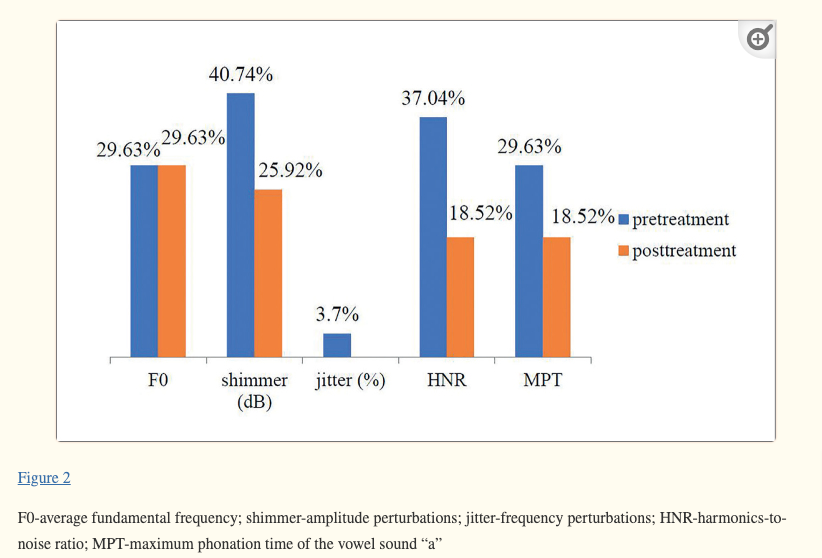
These symptoms are particularly concerning to those who are musically inclined and to those who value the quality of their voice for work, play, or for any other reason.
Unlike periorbital edema, vocal changes can occur even with mild thyroid disease.
It seems that some people are more affected than others and the reason for this isn’t known.
Beyond the impact that hormones can have on vocal cords, your thyroid is anatomically quite close to your vocal cords which may be part of the reason it can impact your voice.
If, for instance, your thyroid gland swells up, it’s possible that this swelling could put pressure on structures in your neck and negatively influence their function.
In the case of thyroid disease, it seems that there are multiple reasons why and how it impacts the voice of certain patients.
Most of the time, the vocal changes that occur with hypothyroidism will not be noticed by most people except those who use their voice professionally.
#7. Broadening of the Nose & Enlargement of the Tongue
In advanced hypothyroidism, you may start to experience changes to the shape and structure of both your nose and tongue (9)!
These physical changes aren’t typically seen in developed countries because thyroid disease is caught early, but they are potential consequences of advanced hypothyroidism.
#8. Enlargement of the Eyes (Proptosis)
Enlargement of the eyes, referred to as thyroid eye disease, is typically associated with hyperthyroid states but up to 6% of cases can be associated with hypothyroidism (10).
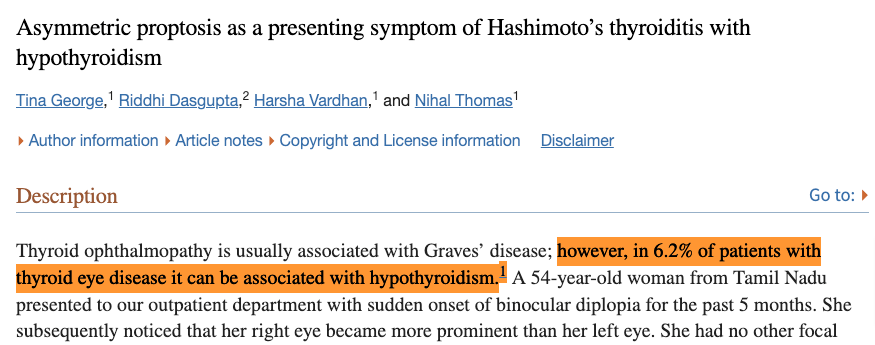
I’m including it here because, while rare, it can still happen.
Thyroid eye disease (TED for short) (11) causes bulging or enlargement of the eyes which then protrude from the eye sockets.
This is a particularly challenging issue to treat because it stems more from the interaction between the muscles of your eyes and your immune system than from thyroid hormone levels.
Treatment consists of managing the immune system which is usually enough to reduce the swelling and enlargement of the tissues around the eyes.
For most hypothyroid patients, this isn’t an issue, but if you are experiencing eye bulging then make sure to test for Graves’ disease as well as thyroid antibodies that tend to be associated with Hashimoto’s thyroiditis.
Most of the symptoms we’ve discussed so far stem from altered thyroid hormone states whereas this one stems from immune dysregulation putting it in a different category.
Final Thoughts
Hypothyroidism and low thyroid states have the potential to impact your physical appearance in more ways than one.
From its impact on the structure of your face to its impact on the quality of your skin, untreated hypothyroidism can make you look different and steal away your beauty.
The good news?
Treating your thyroid means that you can reverse the majority of these changes.
The bad news?
Optimizing your thyroid will most likely require much more than just taking thyroid medication and calling it a day.
Combining lifestyle changes like eating whole foods, replacing nutrient deficiencies, exercising regularly, getting quality sleep, and managing your stress can all improve your thyroid function.
Now I want to hear from you:
Have you noticed a change in your physical appearance after being diagnosed with hypothyroidism?
Do you feel that your thyroid is responsible for stealing away some of your beauty?
What physical changes have you noticed?
Have you seen any improvement in these changes with the use of thyroid medication?
Leave your comments and questions below!
Scientific References
#1. ncbi.nlm.nih.gov/pmc/articles/PMC3790843/
#2. ibisworld.com/industry-statistics/market-size/weight-loss-services-united-states/
#3. pubmed.ncbi.nlm.nih.gov/11888493/
#4. ncbi.nlm.nih.gov/pmc/articles/PMC2755111/
#5. ncbi.nlm.nih.gov/pmc/articles/PMC5885810/
#6. ncbi.nlm.nih.gov/pmc/articles/PMC4454174/
#7. ncbi.nlm.nih.gov/pmc/articles/PMC5821156/
#8. ncbi.nlm.nih.gov/pmc/articles/PMC6592446/
#9. ncbi.nlm.nih.gov/pmc/articles/PMC3169868/
#10. ncbi.nlm.nih.gov/pmc/articles/PMC5878285/
#11. ncbi.nlm.nih.gov/books/NBK582134/
